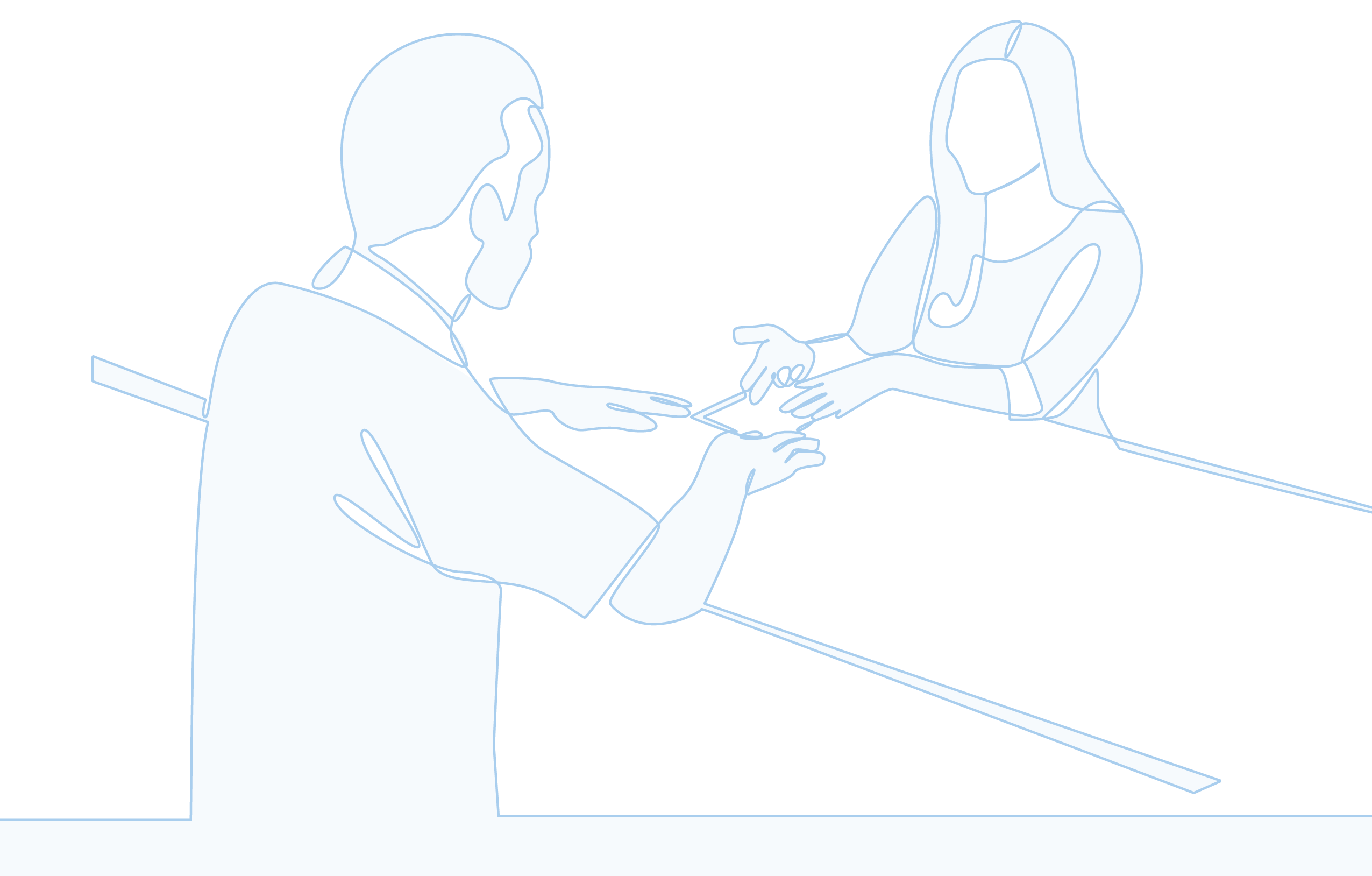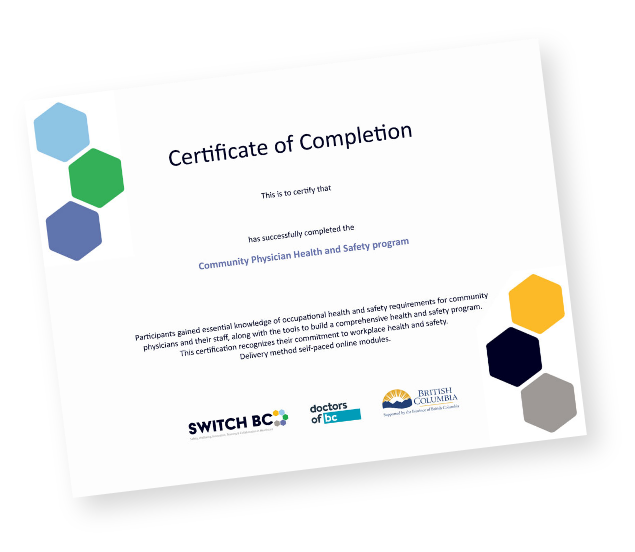Roles, Rights, and Responsibilities
When it comes to workplace health and safety, community physicians, medical office assistants, nurses, and allied health workers all have a role to play. Employers, supervisors, and workers each have significant legal responsibilities to ensure healthy and safe workplaces.

Employers
-
Complete Review of Responsibilities
An employer includes anyone who hires, apprentices, or contracts a person to work, whether the agreement is written, oral, or implied.
Employers have a legal responsibility to ensure the health and safety of all staff and contractors in the clinic.
Legal responsibilities of the employer include:
- Assessing the risk of any known or reasonably foreseeable hazards in the workplace, implementing control measures to reduce the risk of harm to employees, and communicating this information to workers.
- Not allowing workers to remain at the workplace who appear to be impaired by fatigue or another condition.
- Ensuring workers understand their rights and comply with their duties under the Workers Compensation Act (WCA) and OHS regulations (OHSR).
- Complying with provincial laws and regulations, and any applicable orders issued by WorkSafeBC.
- Cooperating with WorkSafeBC, its safety officers, and any other person carrying out a duty under the OHS provisions or the regulations.
- Providing protective equipment, devices, and clothing as required by regulation, and ensuring these are kept in good condition, replaced as needed, and used by workers.
- Making a copy of the WCA and OHSR readily available for review by staff and posting a notice advising how to access this copy.
Employers must also establish workplace health and safety policies and programs in accordance with regulations by:
- Providing workers with the information, instruction, training, and supervision necessary to ensure the health and safety of those workers in carrying out their duties, and to ensure the health and safety of other workers at the clinic.
- Consulting and cooperating with the joint occupational health and safety committee or the worker health and safety representative.
- Regularly reviewing written policies and procedures.
-
Review the Work Refusal Process
When workers refuse work they think is unsafe, employers must follow the steps set out in OHS Regulation Section 3.12 to investigate the work refusal and ensure that any unsafe conditions are remedied. The following flowchart can guide you through the process.
-
Review Stay-at-Work/Return-to-Work Responsibilities
If an occupational injury or illness occurs at the workplace, employers must:
- Maintain collaborative communication with the affected employee(s).
- Provide information to WorkSafeBC as required, and in a timely manner.
- Support the affected employee(s) in returning to work after the injury resolves.
If an employer has more than twenty regularly employed staff, they will potentially have additional obligations to maintain the injured employee’s employment during their recovery.
Supervisors
-
Complete Review of Responsibilities
A supervisor is a person who instructs, directs and controls workers in the performance of their duties.
Supervisors, including physicians and office managers, must ensure the health and safety of all staff under their direct supervision.
This includes:
- Being knowledgeable about the OHS provisions and those regulations applicable to the work being supervised.
- Complying with the OHS provisions, the regulations, and any applicable WorkSafeBC orders.
- Not allowing workers to remain at the workplace who appear to be impaired by fatigue or another condition.
Supervisors must ensure staff:
- Are aware of all known or reasonably foreseeable health or safety hazards in the area where they work.
- Comply with the OHS provisions, the regulations, and any applicable orders.
- Consult and cooperate with the joint occupational health and safety committee or the worker health and safety representative for the workplace
- Cooperate with the WorkSafeBC Board, safety officers of the Board, and any other person carrying out a duty under the OHS provisions or the regulations.
Workers
-
Complete Review of Responsibilities
All clinic workers, including medical office staff, clinic managers, physicians, nurses, residents, students, learners not under a contract of service or apprenticeship, and other clinicians, such as Primary Care Network allied health staff, must:
- Take reasonable care to protect their own health and safety, and the health and safety of other people who may be affected by their acts or omissions at work.
- Comply with the OHS provisions, the regulations, and any applicable WorkSafeBC orders.
- Carry out their work in accordance with established safe work procedures as required by the OHS provisions and the regulations.
- Use or wear protective equipment, devices, and clothing as required.
- Not engage in horseplay or similar conduct that may endanger the worker or any other person.
- Ensure that their ability to work without risk to their own health or safety, or to the health or safety of any other person, is not impaired by alcohol, drugs, or other causes.
- Cooperate with the joint occupational health and safety committee or the worker health and safety representative, where applicable, for the clinic.
- Cooperate with the WorkSafeBC Board, safety officers of the Board, and any other person carrying out a duty under the OHS provisions or the regulations.
- Report to the supervisor or employer:
- Any contravention of the OHS provisions, the regulations, or an applicable order of which the worker is aware.
- The absence of or defect in any protective equipment, device or clothing, or the existence of any other hazard that the worker considers is likely to endanger them or any other person.
- Situations where a worker suspects another worker is impaired while at work.
In British Columbia, all workers are entitled to three fundamental rights under occupational health and safety regulations:
- The right to refuse unsafe work.
- The right to be informed about health and safety matters.
- The right to participate in health and safety activities in the workplace.
Multiple-employer Clinic
-
Complete Review of Responsibilities
When multiple employers share a workplace, the clinic owner is considered the prime contractor and is responsible for coordinating health and safety, unless otherwise stated in a written agreement with one of the employers/contractors in the workplace. The clinic owner is the person or corporation who owns or rents the workspace.
The prime contractor of a multiple-employer workplace must:
- Coordinate the activities of employers, workers, and other persons at the workplace related to occupational health and safety.
- Establish and maintain, as far as reasonably practicable, a system or process to ensure compliance with health and safety requirements. The system may include all the health and safety topics covered on the CPHS web portal.
- Be provided with the name of the person each employer has designated to supervise their own workers at the workplace.
What does that really mean? It means the prime contractor is responsible for:
- Having systems in place to ensure two-way communication with other employers in the workplace (subcontractors) by the following:
- Receiving from each employer in the workplace the names of the persons designated to (1) supervise their workers and (2) be responsible for their own health and safety activities.
- Attending meetings with subcontractors to coordinate safety and ensure compliance with health and safety requirements.
- Ensuring subcontractors notify the prime contractor in advance of any undertaking likely to create a hazard for a worker of another subcontractor.
- Communicating any known hazards to all affected subcontractors and workers.
- Coordination between the different employers:
- Identifying and setting expectations for each subcontractor’s safety contact.
- Coordinating all safety-related activities, from orientations to monthly health and safety meetings.
- Establish an emergency response plan and communicate it to all workers.
- Maintain accurate records:
- Keeping accurate records and notes is a must.
- Documentation demonstrating the coordination of safety-related activities and a system to ensure compliance with WCA and OHSR, such as orientation records, meeting minutes, formal risk assessments, inspection records, first aid records, incident investigation reports, and other training records.
Contractor Management
-
Review Considerations
When hiring a contractor (i.e., cleaners, maintenance workers), obtain a clearance letter from WorkSafeBC (WSBC), addressed to the clinic, confirming that the contractor is “active and in good standing” for the entire period of your contract. A clearance letter confirms a business is registered with WSBC and paying its premiums. If you hire a registered contractor who is not making required payments to WSBC, the clinic could be liable for insurance premiums relating to the work or service they provided to the clinic.
Keep in mind: contracted physicians may be considered clinic workers. WorkSafeBC states that a contractor is likely to be considered your worker, not a contractor, if they provide only labour, if they supply labour and minor materials, or if they work regular hours for you on an ongoing basis (Contractors – WorkSafeBC).


